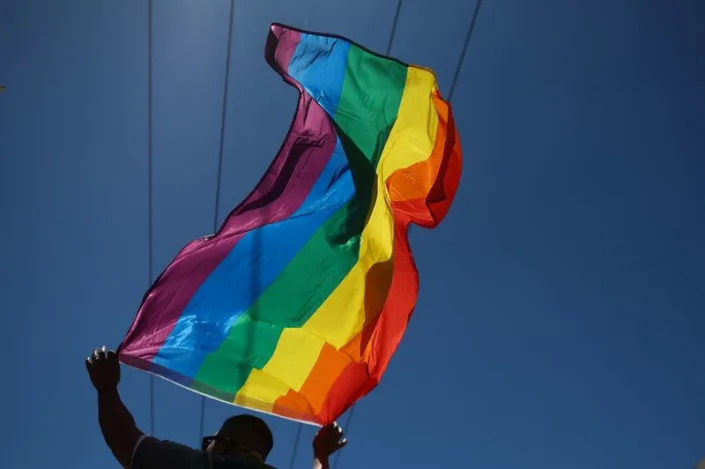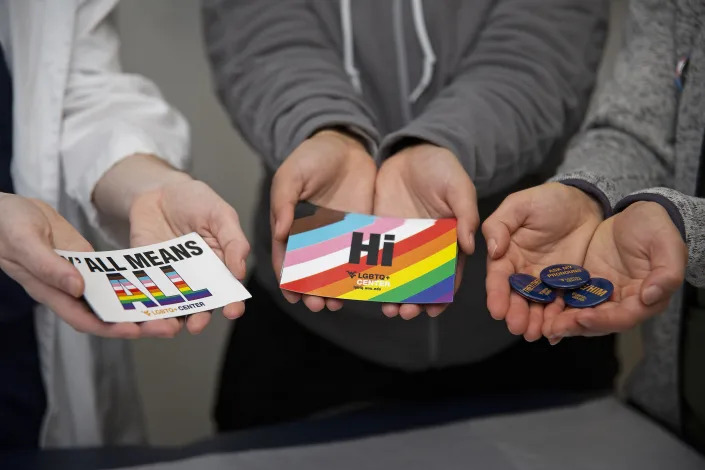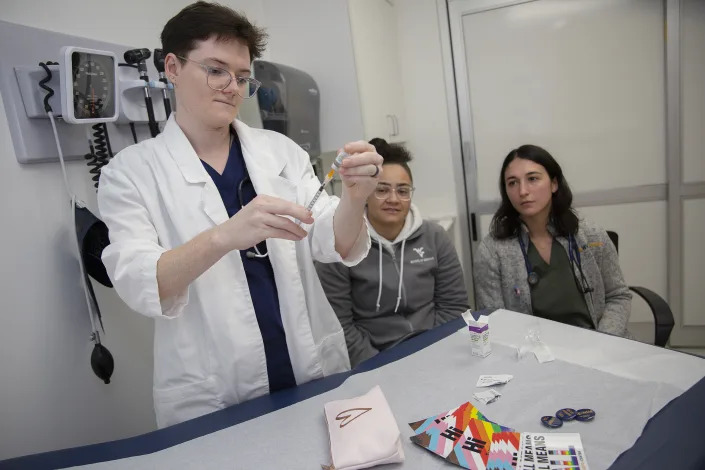Artwork referring to abortion removed from Idaho public college exhibition

Ed Pilkington
A public college in Idaho is coming under pressure to explain why it has removed from an upcoming exhibition in its Center for Arts & History several artworks dealing with reproductive health and abortion.
Related: California cuts ties with Walgreens after company limits access to abortion pills
The American Civil Liberties Union (ACLU) and the National Coalition Against Censorship have jointly written to Lewis-Clark State College expressing “alarm” at the decision to remove several pieces.
Their letter says that the college’s response demonstrated the potential abuses of new laws that have come into effect in Idaho banning the use of public funds to “promote” or “counsel in favor” of pregnancy terminations.
Titled Unconditional Care, the show invites artists to reflect on some of the most pressing health issues today – from chronic illness to disability and pregnancy. The participants share the stories of people directly affected by the challenges.
Items that touch on abortion have been singled out for removal from the exhibition. Artists were told their work violated Idaho state law that kicked in after the US supreme court overturned the right to an abortion enshrined in Roe v Wade.
Scarlet Kim, a staff attorney with the ACLU’s speech, privacy and technology project, said that the removal of works of art silenced the voices of women.
“It jeopardizes a bedrock first amendment principle that the state refrain from interfering with expressive activity because it disagrees with a particular point of view,” Kim said.
Monitors of free speech have warned that the supreme court’s eradication of federal abortion protections would soon make itself felt within the cultural realm through censorship. Thirteen states, including Idaho, have effectively banned abortion.
Related: South Carolina woman arrested for allegedly using pills to end pregnancy
Jeremy Young, Pen America’s senior manager for free expression and education, said that abortion bans were inevitably spawning bans on speech – especially in educational environments.
“You cannot ban abortion without banning speech about abortion, as Lewis-Clark students are now discovering,” he said.
Six artworks have been removed from the Unconditional Care exhibition at the instruction of senior college administrators, and a seventh has been edited to remove abortion references. Four of the works are videos and audio recordings created by a New York-based artist, Lydia Nobles, as part of a series named As I Sit Waiting.
It highlights the stories of women who have had abortions or were forced to carry pregnancies to term.
Katrina Majkut, an artist who was commissioned to curate the Lewis-Clark exhibition, also had one of her own artworks removed. Titled Medical Abortion Pills, it consists of embroidered images of the medical abortion pills mifepristone and misoprostol.
College officials objected to the descriptive label that went alongside the artwork which gave basic and accurate facts about the abortion pill, as well as factual information on Idaho’s abortion laws in a “post-Roe America”. Majkut said the administrators would not let her use the phrase “post-Roe”.
“I did try to have some alternative stand-in, such as a curtain placed over the work or a sign that said ‘Artwork has been removed in accordance with law’, but that was all rejected too.”
The artist added that she has shown the same body of work in more than 25 college galleries across the country, “and have never been censored or had an issue of any kind”. She said that the show she had curated was not protest art, and it was educational rather than inflammatory.
“Censorship of art is never OK. I see this as censorship of art, as well as suppression of academic learning.”
Michelle Hartney, a Chicago-based artist, also had a piece removed from her series Unplanned Parenthood which focuses on the 250,000 mothers who wrote to the founder of Planned Parenthood, Margaret Sanger, in the 1920s. The censored item incorporated one of those original handwritten letters.
“It was really mild,” Hartney said. “It was simply a woman saying she had had an abortion.”
Asked for her response to the decision to remove the work, Hartney said: “It scares me. It’s frightening where we are going in this country.”
Lewis-Clark State College is based in Lewiston, Idaho, and has about 3,600 students. The Guardian invited the institution to explain why it had opted to censor the show, and a spokesperson replied that “after obtaining legal advice, per Idaho Code Section 18-8705, some of the proposed exhibits could not be included in the exhibition”.
Section 18-8705 is part of the No Public Funds for Abortion Act that was passed by Idaho’s Republican legislature in 2021, months after the US supreme court overturned the right to an abortion. The law forbids public entities from contracting or participating in any commercial transaction involving an abortion provider or affiliate, and creates a “gag rule” that bans individual public employees from counselling in favor of a pregnancy termination or referring anyone to an abortion clinic.
The prohibition has spread jitters across the state, especially in public colleges and universities. Last September the general counsel of the University of Idaho sent all its staff – including student workers – a lengthy memo that told them to remain “neutral” over abortion and “proceed cautiously at any time that a discussion moves in the direction of reproductive health”.
The memo reached the attention of Joe Biden in the White House. “Folks, what century are we in?” the US president said when he learned of the university’s instructions.
Last week a billboard truck displaying advice on how to access abortion pills that was being driven through the streets of Boise, Idaho, by the nonprofit Mayday Health was ordered to leave the city by police officers. The group said it was a violation of its basic constitutional rights.

Ed Pilkington
THE GUARDIAN
Tue, March 7, 2023
Tue, March 7, 2023
A public college in Idaho is coming under pressure to explain why it has removed from an upcoming exhibition in its Center for Arts & History several artworks dealing with reproductive health and abortion.
Related: California cuts ties with Walgreens after company limits access to abortion pills
The American Civil Liberties Union (ACLU) and the National Coalition Against Censorship have jointly written to Lewis-Clark State College expressing “alarm” at the decision to remove several pieces.
Their letter says that the college’s response demonstrated the potential abuses of new laws that have come into effect in Idaho banning the use of public funds to “promote” or “counsel in favor” of pregnancy terminations.
Titled Unconditional Care, the show invites artists to reflect on some of the most pressing health issues today – from chronic illness to disability and pregnancy. The participants share the stories of people directly affected by the challenges.
Items that touch on abortion have been singled out for removal from the exhibition. Artists were told their work violated Idaho state law that kicked in after the US supreme court overturned the right to an abortion enshrined in Roe v Wade.
Scarlet Kim, a staff attorney with the ACLU’s speech, privacy and technology project, said that the removal of works of art silenced the voices of women.
“It jeopardizes a bedrock first amendment principle that the state refrain from interfering with expressive activity because it disagrees with a particular point of view,” Kim said.
Monitors of free speech have warned that the supreme court’s eradication of federal abortion protections would soon make itself felt within the cultural realm through censorship. Thirteen states, including Idaho, have effectively banned abortion.
Related: South Carolina woman arrested for allegedly using pills to end pregnancy
Jeremy Young, Pen America’s senior manager for free expression and education, said that abortion bans were inevitably spawning bans on speech – especially in educational environments.
“You cannot ban abortion without banning speech about abortion, as Lewis-Clark students are now discovering,” he said.
Six artworks have been removed from the Unconditional Care exhibition at the instruction of senior college administrators, and a seventh has been edited to remove abortion references. Four of the works are videos and audio recordings created by a New York-based artist, Lydia Nobles, as part of a series named As I Sit Waiting.
It highlights the stories of women who have had abortions or were forced to carry pregnancies to term.
Katrina Majkut, an artist who was commissioned to curate the Lewis-Clark exhibition, also had one of her own artworks removed. Titled Medical Abortion Pills, it consists of embroidered images of the medical abortion pills mifepristone and misoprostol.
College officials objected to the descriptive label that went alongside the artwork which gave basic and accurate facts about the abortion pill, as well as factual information on Idaho’s abortion laws in a “post-Roe America”. Majkut said the administrators would not let her use the phrase “post-Roe”.
It scares me. It’s frightening where we are going in this countryArtist Michelle Hartney
“I did try to have some alternative stand-in, such as a curtain placed over the work or a sign that said ‘Artwork has been removed in accordance with law’, but that was all rejected too.”
The artist added that she has shown the same body of work in more than 25 college galleries across the country, “and have never been censored or had an issue of any kind”. She said that the show she had curated was not protest art, and it was educational rather than inflammatory.
“Censorship of art is never OK. I see this as censorship of art, as well as suppression of academic learning.”
Michelle Hartney, a Chicago-based artist, also had a piece removed from her series Unplanned Parenthood which focuses on the 250,000 mothers who wrote to the founder of Planned Parenthood, Margaret Sanger, in the 1920s. The censored item incorporated one of those original handwritten letters.
“It was really mild,” Hartney said. “It was simply a woman saying she had had an abortion.”
Asked for her response to the decision to remove the work, Hartney said: “It scares me. It’s frightening where we are going in this country.”
Lewis-Clark State College is based in Lewiston, Idaho, and has about 3,600 students. The Guardian invited the institution to explain why it had opted to censor the show, and a spokesperson replied that “after obtaining legal advice, per Idaho Code Section 18-8705, some of the proposed exhibits could not be included in the exhibition”.
Section 18-8705 is part of the No Public Funds for Abortion Act that was passed by Idaho’s Republican legislature in 2021, months after the US supreme court overturned the right to an abortion. The law forbids public entities from contracting or participating in any commercial transaction involving an abortion provider or affiliate, and creates a “gag rule” that bans individual public employees from counselling in favor of a pregnancy termination or referring anyone to an abortion clinic.
The prohibition has spread jitters across the state, especially in public colleges and universities. Last September the general counsel of the University of Idaho sent all its staff – including student workers – a lengthy memo that told them to remain “neutral” over abortion and “proceed cautiously at any time that a discussion moves in the direction of reproductive health”.
The memo reached the attention of Joe Biden in the White House. “Folks, what century are we in?” the US president said when he learned of the university’s instructions.
Last week a billboard truck displaying advice on how to access abortion pills that was being driven through the streets of Boise, Idaho, by the nonprofit Mayday Health was ordered to leave the city by police officers. The group said it was a violation of its basic constitutional rights.
Idaho College Pulls 6 Abortion-Related Artworks from Exhibit, Citing State Law
Susan Rinkunas
Tue, March 7, 2023

Photo: Getty (Getty Images)
Update March 7, 2023: Lewis-Clark State College also censored art from the exhibit’s curator Katrina Majkut—a cross stitch of abortion pills with a label that explained the efficacy and use statistics for the pills. A banned letter from Michelle Hartney makes for a total of six works excluded. “I did try to have some alternative stand-in, such as a curtain placed over the work or a sign that said ‘Artwork has been removed in accordance with law’, but that was all rejected too.” Majkut told The Guardian. “Censorship of art is never OK. I see this as censorship of art, as well as suppression of academic learning.”
A college in Idaho reportedly pulled artwork from an on-campus exhibit because it was about abortion, disingenuously citing a 2021 state law that bans public funding from being used to “promote” abortion in any way.
Lewis-Clark State College in Lewiston opened an exhibition titled Unconditional Care at its Center for Arts & History on Friday. According to the American Civil Liberties Union, an exhibit curator invited New York-based artist Lydia Nobles to display work from her abortion-related series titled As I Sit Waiting. Nobles writes on her site that she “collected narratives of people’s experiences with abortion access or lack thereof to create a sculpture in honor of them,” and she was set to display three videos and one audio recording of her interviews.
The ACLU said the curator viewed and vetted the works and was discussing installation with Nobles. But then a few days before the opening, the school informed Nobles that her work would no longer be in the exhibit because of the school’s interpretation of the state No Public Funds for Abortion Act (NPFAA), passed in 2021.
When reached for comment, a spokesperson for Lewis-Clark State College told Jezebel that “After obtaining legal advice, per Idaho Code Section 18-8705, some of the proposed exhibits could not be included in the exhibition.” That’s the NPFAA.
The ACLU, the ACLU of Idaho, and the National Coalition Against Censorship (NCAC) sent a letter to the school on Friday condemning the move and urging the school to show the works. Scarlet Kim, a staff attorney with the ACLU Speech, Privacy, and Technology Project said in a statement, “This decision silences their voices and deprives the public of a critical opportunity to engage in a broader conversation about these important topics. It jeopardizes a bedrock First Amendment principle that the state refrain from interfering with expressive activity because it disagrees with a particular point of view.”
Nobles told Jezebel in a statement that “As I Sit Waiting shares diverse experiences around reproductive rights and pregnancy. I seek to bring real life accounts to the forefront to foster empathy and listening. My work critiques the systems and structures that make talking about these everyday healthcare topics stigmatizing or unsafe. These kinds of critical conversations are especially important in learning institutions where students are formulating their worldviews based on their identities and experiences.”
This isn’t the first time Idaho schools have made news for their overly cautious interpretation of the NPFAA. In September, lawyers for both Boise State University and the University of Idaho cited the law when they instructed staff not to refer students for abortion or emergency contraception, while IU went further to ban referrals for birth control—including condoms.
The art exhibit news comes amid a broader crackdown on abortion-related speech. Last week, lawmakers in Texas and Iowa introduced bills that would ban internet service providers from hosting web sites that provide information about abortion pills.
We await an impassioned defense from the free speech brigade. *Taps earpiece* What’s that—oh, they only care about freedom to espouse conservative views? Noted.
Jezebel
Idaho’s abortion gag law imposes a regime of censorship. Now artwork is being removed | OpinionSusan Rinkunas
Tue, March 7, 2023

Photo: Getty (Getty Images)
Update March 7, 2023: Lewis-Clark State College also censored art from the exhibit’s curator Katrina Majkut—a cross stitch of abortion pills with a label that explained the efficacy and use statistics for the pills. A banned letter from Michelle Hartney makes for a total of six works excluded. “I did try to have some alternative stand-in, such as a curtain placed over the work or a sign that said ‘Artwork has been removed in accordance with law’, but that was all rejected too.” Majkut told The Guardian. “Censorship of art is never OK. I see this as censorship of art, as well as suppression of academic learning.”
A college in Idaho reportedly pulled artwork from an on-campus exhibit because it was about abortion, disingenuously citing a 2021 state law that bans public funding from being used to “promote” abortion in any way.
Lewis-Clark State College in Lewiston opened an exhibition titled Unconditional Care at its Center for Arts & History on Friday. According to the American Civil Liberties Union, an exhibit curator invited New York-based artist Lydia Nobles to display work from her abortion-related series titled As I Sit Waiting. Nobles writes on her site that she “collected narratives of people’s experiences with abortion access or lack thereof to create a sculpture in honor of them,” and she was set to display three videos and one audio recording of her interviews.
The ACLU said the curator viewed and vetted the works and was discussing installation with Nobles. But then a few days before the opening, the school informed Nobles that her work would no longer be in the exhibit because of the school’s interpretation of the state No Public Funds for Abortion Act (NPFAA), passed in 2021.
When reached for comment, a spokesperson for Lewis-Clark State College told Jezebel that “After obtaining legal advice, per Idaho Code Section 18-8705, some of the proposed exhibits could not be included in the exhibition.” That’s the NPFAA.
The ACLU, the ACLU of Idaho, and the National Coalition Against Censorship (NCAC) sent a letter to the school on Friday condemning the move and urging the school to show the works. Scarlet Kim, a staff attorney with the ACLU Speech, Privacy, and Technology Project said in a statement, “This decision silences their voices and deprives the public of a critical opportunity to engage in a broader conversation about these important topics. It jeopardizes a bedrock First Amendment principle that the state refrain from interfering with expressive activity because it disagrees with a particular point of view.”
Nobles told Jezebel in a statement that “As I Sit Waiting shares diverse experiences around reproductive rights and pregnancy. I seek to bring real life accounts to the forefront to foster empathy and listening. My work critiques the systems and structures that make talking about these everyday healthcare topics stigmatizing or unsafe. These kinds of critical conversations are especially important in learning institutions where students are formulating their worldviews based on their identities and experiences.”
This isn’t the first time Idaho schools have made news for their overly cautious interpretation of the NPFAA. In September, lawyers for both Boise State University and the University of Idaho cited the law when they instructed staff not to refer students for abortion or emergency contraception, while IU went further to ban referrals for birth control—including condoms.
The art exhibit news comes amid a broader crackdown on abortion-related speech. Last week, lawmakers in Texas and Iowa introduced bills that would ban internet service providers from hosting web sites that provide information about abortion pills.
We await an impassioned defense from the free speech brigade. *Taps earpiece* What’s that—oh, they only care about freedom to espouse conservative views? Noted.
Jezebel

Darin Oswald/doswald@idahostatesman.com
The Editorial Board
Tue, March 7, 2023
The rising wave of censorship in Idaho has now removed items from an art exhibition, as The Guardian reported Tuesday. Lewis-Clark State College is hosting an exhibition of artworks on health care issues. But artworks dealing with the subject of abortion were removed for fear they would violate the state’s abortion gag rule, contained in the 2021 No Public Funds for Abortion Act.
The artworks you cannot see were in no way graphic or obscene. They did not even encourage women to seek abortions. They simply acknowledged the existence of abortion.
But Idaho’s laws are so vague and poorly written that the college can’t be sure that a touring art installation wouldn’t violate them. So six pieces of art were removed from the show. The ACLU and the National Coalition Against Censorship have written to the college, urging it to reconsider its decision.
It’s understandable that the college would be afraid. Idaho’s abortion gag rule treats “promoting abortion” — a vague, undefined category — as a misuse of public funds. At a minimum, that could mean college officers who exhibited the works potentially face a year in jail and a $1,000 fine. If more than $300 were spent on the art show, it’s conceivable they could face 14 years in prison.
The point of imposing penalties like that on speech is to impose fear. And the point of fear is to impose silence. If it’s unclear whether an installation of stories from women who have had an abortion is forbidden or not, better not to risk it.
And there’s another thing that’s spreading such fear: an increasing knowledge that the Idaho Legislature will try to hurt you if you make it mad. That its Republican majority is often vengeful, and that it treats neither the Idaho nor U.S. Constitution — nor even supposed beliefs about the proper role of government — as a serious constraint upon it.
The same year the Legislature passed the No Public Funds for Abortion Act, they cut universities’ budgets in retaliation for teaching things that some in the Republican majority did not like.
An art show that discusses abortion, among other health care topics? Don’t do it, they might chop your budget. Imagine what might happen if a political scientist publishes work on the rise of far-right political extremism in Idaho.
This is the message Idaho’s public universities have already received, and we can see it in their actions.
And so a regime of censorship has been achieved — not one that is theoretical, but one that has already been in effect for years.
The safest path is clear:
Don’t talk about slavery.
Don’t talk about the people who were killed to make room for colonization.
Don’t talk about abuses of police authority.
Don’t talk about the 144 years for which women were denied the vote.
Don’t talk about abortion.
There is no similar regime of censorship on the other side. Professor Scott Yenor of Boise State University has said vile things about women repeatedly, things so offensive they enraged most people. He has not lost his job.
And there was never any worry that Boise State University’s budget would be cut because Yenor worked there.
Lawmakers of good faith need to reckon seriously with what has happened. You are the proprietors of a regime of censorship. Whether you helped build it or not, it is your job to tear it down.
And Idaho’s universities should put up stiffer resistance. Universities are supposed to be havens for free intellectual inquiry. That requires fighting back on efforts to restrict that freedom.
“Every person may freely speak, write and publish on all subjects, being responsible for the abuse of that liberty,” reads the Idaho Constitution.
And if some lawmakers won’t heed those words on their own, it’s time for a court to remind them.
Statesman editorials are the unsigned opinion of the Idaho Statesman’s editorial board. Board members are opinion editor Scott McIntosh, opinion writer Bryan Clark, editor Chadd Cripe, and newsroom editors Dana Oland and Jim Keyser.


























